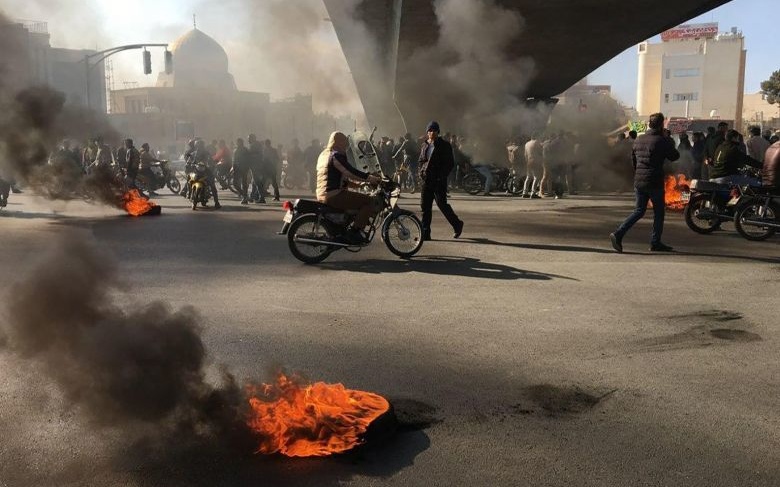Protesters burn tires in Isfahan in central Iran, November 16, 2019 (AFP)
Iran’s Supreme Leader has intervened after mass protests over a rise in petrol prices, and reports of the killing of demonstrators.
Ayatollah Khamenei said on Sunday that while he is not an expert on the sbuject, he supports last week’s implementation of reduced subsidies and introduction of rationing.
“The heads of power branches have sat down and taken a decision supported by experts. The decision must be implemented,” he said.
Clashes were reported on Saturday afternoon in cities such as Shiraz, Bushehr, and Tehran. Unconfirmed claims said security forces fired on gatherings, killing several people.
Radio Farda reports one confirmed death of a protester, in Sirjan in southern Iran on Friday.
Iranian authorities said they would deal firmly with the protests, claiming they were fostered by “elements beyond Iran’s borders.”
Claimed footage from Tehran:
Security forces open fired on the Saveh Road to disperse the protesters
ICHR strongly condemns the direct firing on protesters against the increase in gasoline price, and the Iranian government must be held accountable.#نه_به_جمهورى_اسلامى #نه_به_گرانى_بنزين #نه_به_خريد_بنزين pic.twitter.com/Ye84HTLoNs
— International Center For Human Rights (@ICHRCanada) November 16, 2019
Implemented on Friday, the Government measures raise the the price of subsidized petrol from 10,000 rials to 15,000 rials (12.7 US cents) per liter. The monthly subsidized ration for each private car is now 60 liters per month — with the price at 30,000 rials per liter after that.
Authorities are trying to combat fuel smuggling to neighboring countries amid comprehensive US sanctions on Iran’s oil exports. The Government is also facing budget difficulties with the fall in exports of between 80% and 95%.
Mohammad Bagher Nobakht, the head of Iran’s Planning and Budget Organization, said on State TV that revenues from the increased petrol prices will go towards additional subsidies for 18 million families — about 60 million of Iran’s 82 million population.
See Iran Daily, Nov 15: Government Raises Petrol Prices by 50%
Footage from Saturday morning:
برپایه تصاویر دریافتی از شمار زیادی از شهرهای ایران، اعتراضها به گرانی #بنزین برای دومین روز و از نخستین ساعات بامداد روز شنبه ادامه یافته است. به گفته شاهدان عینی در برخی نقاط درگیری بین نیروهای امنیتی و معترضان به کشته و زخمی شدن معترضان انجامیده است. pic.twitter.com/9gCpdZgpxT
— RadioFarda|راديو فردا (@RadioFarda_) November 16, 2019
Extraordinary Parliament Session on Sunday
Iran’s Parliament initially scheduled an extraordinary meeting for Saturday, later moving it to Sunday.
The agenda includes an urgent motion to revoke the price rise, agreed between President Hassan Rouhani, Parliament Speaker Ali Larijani, and judiciary head Ebrahim Raisi.
Grand Ayatollahs Lotfollah Safi Golpayegani and Mohammad Alavi Gorgani called on Parliament to implement the reversal.
But reformist MP Parvaneh Salahshouri said “the Majlis is no longer in control” in Iran.
An #Iranian citizen protests the increase of gasoline price in his own way. #IranProtests #بنزین_۳۰۰۰_تومنی pic.twitter.com/J6SAOvxsz5
— Roj (@RojHat09) November 16, 2019

